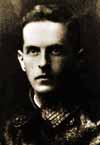


Please Contact Us if you have any questions or to report any problems.
PITHY QUOTE FROM Wittgenstein: Gesamtbriefwechsel (2nd Release)
By the bye did you read Smuts' address to the B.A. It's the most marvellous collection of rot, and sententious rot at that.
Ludwig Wittgenstein: Gesamtbriefwechsel/ Complete Correspondence. Von William Heriot Watson↑ an Ludwig Wittgenstein↑, 12. 11. 1931
Wittgenstein: Gesamtbriefwechsel/Complete Correspondence (2nd Release) (2011). Innsbrucker Electronic Edition.
ISBN: 978-1-57085-037-0
Language: German and English (some Norwegian and Russian)
|
Ludwig Wittgenstein. Portrait on receipt of his teaching qualification
|
List of ContentsThe first edition of the Gesamtbriefwechsel (2004) included approximately 2300 pieces of correspondence to and from Wittgenstein. Besides the commentary on every letter elucidating all names, places and dates, the edition provided some 300 biographies of persons appearing in the letters. The commentary also included a detailed chronology of Wittgenstein's movements and activities throughout his life, as well as indices of the literature and music which are mentioned in the correspondence. The Brenner Archiv has just (2011) completed a second edition of the Gesamtbriefwechsel retaining everything from the first edition but now with over 2500 letters and new and updated biographies. Many of the new letters are highly important, including a series between Ludwig and his brother Paul. Further, the database has been recast, as described in the Editorial Report from Joseph Wang, to enable new types of search functionality. History of the Gesamtbriefwechsel Project In 1967, Brian McGuinness edited the first segment of Wittgenstein’s correspondence to be published, the philosopher’s letters to Paul Engelmann. In the following decades, Professor McGuinness and the late Professor G. H. von Wright were active in editing further collections of Wittgenstein’s correspondence with, among others, Bertrand Russell, C. K. Ogden, David Pinsent, Wittgenstein's Cambridge colleagues, and his family. The Brenner-Archiv's involvement in the publication of Wittgenstein’s correspondence dates from 1969 when Professor von Wright and Walter Methlagl produced their edition of the then-known correspondence with Ludwig von Ficker (founder of the Brenner-Archiv and the person entrusted with the disbursement of Wittgenstein's inheritance in 1914-1916). In 1986, when more of Ficker’s correspondence with Wittgenstein was discovered along with a substantial collection of correspondence from other interlocutors, the idea was born of creating a fully documented master manuscript of the whole of Wittgenstein’s correspondence (Gesamtbriefwechsel) in a unified format. Work on the Gesamtbriefwechsel originated in 1988 through research projects sponsored by the Austrian Research Council (Fonds zur Förderung der wissenschaftlichen Forschung) at the Brenner-Archiv under the direction of Allan Janik and Walter Methlagl. Work has continued on the project ever since. Aside from the collection and preservation of the correspondence, and identification made of all details of persons, dates, places references, etc, every letter has been transcribed into electronic form. Further, the data files have been maintained to preserve ongoing functionality in the ever-changing technological environment. Through the decades, the project has greatly benefited from close association with Brian McGuinness. His unique fund of historical and biographical information about the man and the philosopher, as well as to his extensive collection of Wittgenstein documents, have been an invaluable resource. Ludwig Wittgenstein: Gesamtbriefwechsel/Complete Correspondence contains Wittgenstein's collected correspondence, edited under the auspices of the Brenner-Archiv's Research Institute (University of Innsbruck). Editors (first edition): Monika Seekircher, Brian McGuinness and Anton Unterkircher. Editors (second edition): Anna Coda, Gabriel Citron, Barbara Halder, Allan Janik, Ulrich Lobis, Kerstin Mayr, Brian McGuinness, Michael Schorner, Monika Seekircher and Joseph Wang. Wittgenstein, Ludwig. Gesamtbriefwechsel/Innsbrucker elektronische Ausgabe. 2nd Release (2011). Herausgegeben von Anna Coda, Gabriel Citron, Barbara Halder, Allan Janik, Ulrich Lobis, Kerstin Mayr, Brian McGuinness, Michael Schorner, Monika Seekircher, and Joseph Wang. Im Auftrag des Forschungsinstituts Brenner-Archiv, 2011. |
"There are cases," Coleridge once wrote, "in which more value may be conveyed by the history of a word than by the history of a campaign," and these Past Masters [collections] constitute a great aid to such enterprises. . . . |
